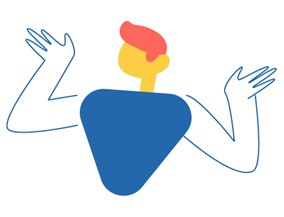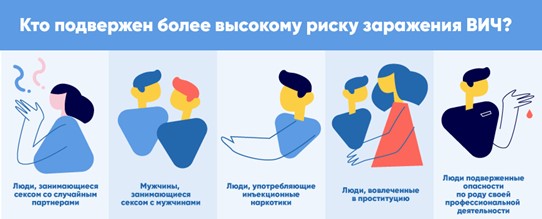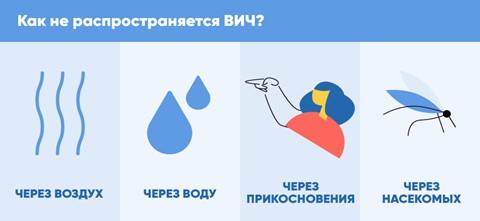- HIV infection, AIDS-what is it?

HIV infection- chronic infectious disease caused by the human immunodeficiency virus (HIV), which damages the cells of the body's immune system.
AIDS(acquired immunodeficiency syndrome) is the last stage of HIV infection, which develops on average 10-12 years after infection and is accompanied by the destruction of the immune system and the occurrence of opportunistic diseases.
- What happens when HIV infection? Do HIV infection have symptoms?
Immediately after HIV infection, most people do not feel anything unusual. The virus hidden in the body begins to multiply and slowly, imperceptibly destroy the human immune system, but in 20% of people can take place in the form of acute retrovirun syndrome (hereinafter - the ORVS). The ORVS can manifest itself in an increase in body temperature, muscle and headaches, rash, an increase in lymph nodes. This condition usually lasts a couple of weeks, after which it passes. As a rule, a person connects these symptoms with SARS or influenza, and not with HIV infection.
After the infection of HIV, a person can look for a long time and feel completely healthy and at the same time transmit the virus to other people. The virus can be in the body for several years before the symptoms of the disease appear.

It should be understood that in this initial period, even testing on HIV can give a wrong result, because the body has not yet developed antibodies to the virus. Antibodies to the virus appear on average for 3 months after infection. To obtain a reliable result, it is best to undergo an HIV examination 3-6 months after a risky situation.
Symptoms of HIV infection necessarily appear in the AIDS stage: against the background of immunodeficiency, a person develops secondary diseases, such as tuberculosis, pneumonia, tumors and other diseases.
- How is HIV transmitted?
- through the blood - most often through general or re -used syringes and needles when using narcotic substances, with piercing and applying tattoos in unsuitable conditions, when using strangers of razor and manicure supplies;
- with unprotected sexual contacts;
- From the HIV-positive mother to the child-during pregnancy, during childbirth or feeding breast milk.

- But how is HIV not transmitted?
- with generally accepted forms of greetings (handshakes, friendly kisses, hugs);
- when using household items, toys, bedding, toilet, bathroom, shower, pool, cutlery and utensils, drinking fountains, sports equipment (saliva, sweat, tears, urine are not dangerous for infection);
- with insect bites;
- airborne droplets (with coughing and sneezing).


- How to protect yourself from HIV infection?
- be true to one sexual partner, who, in turn, should be true to you;
- Pass the HIV test to sexual contact and invite your sexual partner to do the same;
- Always use a condom for sexual contacts if the partner’s HIV status is unknown to you;
- abandon random sexual relations;
- use only individual objects of personal hygiene (razors, manicure supplies, toothbrushes, etc.);
- Do not apply tattoos and piercing, do not pierce the ears outside of specialized institutions;
- Do not use narcotic substances.
HIV risk group is a topic that concerns everyone
As of 01.07.2022, 5597 people with HIV live in Minsk.
In January-July 2022, 279 new cases of HIV infection were identified. In the structure of incidence, men prevailed on the floor - 65.9% of cases. In the structure of the main routes of transmission, the sexual path was 69.9%(heterosexual - 56.6%, homosexual - 13.3%). The parenteral non -medical transmission path during the injection of narcotic substances amounted to 28%. The rest of the cases is associated with the unidentified and vertical transmission routes.
The average age of newly identified HIV-positive persons is 38.5 years. The largest number of cases of HIV infection is registered in age groups of 30-39 years-43.7%, 40-49 years-30.5%.
For 6 months of 2022, more than half of HIV cases were detected among the working population (57.7%). Among the students of universities and osuzes are 7 cases of HIV infection, including 3 among foreign students. A significant proportion was occupied by persons without certain activities - 33.3%.
The fact of identification of HIV infection in the population who arrived from abroad, both in labor migration and for the purpose of tourism (Thailand, Armenia, the Russian Federation, Ukraine, etc.), as well as among drivers carrying out international transportation, is being. In addition, cases of registration of HIV infection among foreign citizens living in the territory of the city of Minsk (citizens of the Russian Federation, Ukraine, Cuba, Nigeria, etc.) have become more frequent.
In Minsk, there is an opportunity to independently make an express test for HIV on saliva, which can be purchased in pharmacies in the city. At the same time, self-testing by saliva, being a preliminary step, in itself cannot ensure the diagnosis of HIV infection-this requires confirming testing.
You can pass an examination for HIV anonymously and for free in any organization of state -owned ownership, where there is a procedural office. You can also contact the state institution “Republican Center for Hygiene of Epidemiology and Public Health” at the address: Minsk, 4 K. Tsetkin St. (Contact phone number of the procedural cabinet 258-22-68).




























